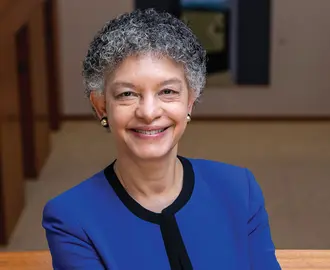Monetary Policy
Economist Stanley Fischer critiques COVID-19 monetary policies
In accepting the inaugural Miriam Pozen Prize, Fischer gives central banks’ response to the pandemic high marks. Larry Summers begs to differ.
Central banks played a crucial role in stabilizing the markets during COVID-19, thanks to their willingness to revise their monetary policy playbooks. Doing so in the future will be crucial as crises increase in frequency, said Stanley Fischer, the economist and inaugural recipient of the Miriam Pozen Prize.
Purchasing corporate and municipal bonds, along with other new monetary policies, “were crucial to halting the downward spiral of markets, lessening the pandemic-driven lines [and] losses of business, and jump-starting the economic recovery,” Fischer said in an address on Nov. 4. “Policymakers should be prepared to continue using unconventional monetary policies in myriad ways to combat future economic crises.”
Fischer served as vice chair of the U.S. Federal Reserve, governor of the Bank of Israel, and chief economist at the World Bank.
A professor of economics at MIT from 1977 to 1988, Fischer was back on campus in Cambridge, Massachusetts to accept the Miriam Pozen award, which recognizes academics and practitioners who have demonstrated outstanding research or practice in financial policy. The Miriam Pozen Prize is awarded every two years in remembrance of the late mother of the former vice chairman of Fidelity Investments and a senior lecturer at MIT Sloan.
The event, sponsored by the MIT Golub Center for Finance and Policy, included remarks from economists Lawrence Summers,Olivier Blanchard, and Kenneth Rogoff, and was moderated by MIT economists James Poterba and Deborah Lucas.
Praise for the speed, scope, and size of the response
Quoting from his new paper, “Comparing the Monetary Policy Responses of Major Central Banks to the Great Financial Crisis and the COVID-19 Pandemic,” Fischer said that the economic recovery was “fast and robust” throughout the developed world, with conditions improving “much more quickly than had originally been anticipated” due to central banks’ willingness to react “in a manner that was unprecedented in terms of the speed, scope, and size of their asset purchases and emergency lending programs.”
While the forceful fiscal policy responses of governments “deserve much of the credit for the economic turnaround," Fischer said the actions of central banks were "crucial to halting the downward spiral of markets, lessening the pandemic-driven lines [and] losses of business, and jump-starting the economic recovery.”
Noting a mere 12 years in between two enormous financial events — the great financial crisis and the COVID-19 pandemic, Fischer said that events of “seismic economic magnitude are taking place more frequently in today's highly globalized and increasingly volatile world.”
“The past two decades have shown how important speed, size, and adaptability are to monetary policy of the 21st century, and they will all continue to be critical for central banks as they contend with future economic downturns,” Fischer said.
Summers not a fan of forward guidance
Related Articles
A panel of distinguished speakers commented on Fischer’s contributions, including Summers, president emeritus of Harvard University and the former U.S. Treasury secretary.
Summers noted that Fischer has had a remarkable career as a central bank leader and as a thinker and a teacher, having taught Ben Bernanke and Mario Draghi, two well-known economists who were each head of central bank during the global financial crisis.
“You served as the vice chairman of the U.S. Federal Reserve Bank during some very important years, when it is generally believed that U.S. monetary policy was managed extremely well,” Summers said.
While Summers said it “is absolutely essential” that central bankers play a crucial role as a market stabilizer of last resort, he questioned the merits of protracted quantitative easing and bringing down long-term interest rates. As far as providing forward guidance, “My instinct has always been that the market doesn’t believe it, so it doesn’t reduce rates very much, but the central bank believes its own forward guidance, and so it applies pressure to constrain subsequently.”
Comments from Forbes, Blanchard, and Rogoff
MIT Sloan professor Kristin Forbes, who has held positions on the Monetary Policy Committee for the Bank of England, the White House’s Council of Economic Advisers, and as a deputy assistant secretary in the U.S. Treasury Department, applauded Fischer for his ability to make macroeconomics understandable to generations of college students. She referenced in particular Fischer’s macroeconomics textbook with Rudiger Dornbusch and Richard Startz as being “ahead of its time.”
Forbes commended Fischer’s ability to concisely summarize in his most recent paper the complexities of central banking, boiling it down to a “pretty easy to read summary of the key events and key takeaways.”
Former International Monetary Fund chief economist Olivier Blanchard called Fischer’s paper “a classic” and a “standard reference” for those who are interested in what central banks have done during both the global financial crisis and the COVID-19 crisis.
Commenting on Fisher’s research, Kenneth Rogoff, a professor of economics and public policy at Harvard, said that fiscal policy is “clearly the primal tool” in a pandemic.
“I believe that interest rate policy is vastly more potent than quantitative easing or forward guidance,” Rogoff said.
Whether Fischer was teaching MIT students or working with IMF staff, Rogoff said of Fisher: “You played a very important role in inspiring people.”
During Fischer’s career, he served as an assistant professor at the University of Chicago and as a professor in MIT’s Department of Economics. In addition to his other policy roles, Fischer also served as deputy managing director of the International Monetary Fund.
Read next: Quant pioneer James Simons on math, money, and philanthropy




